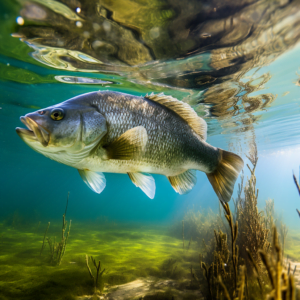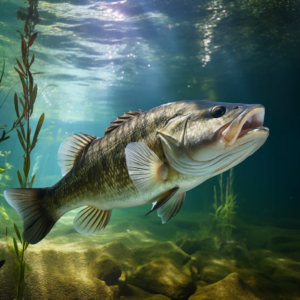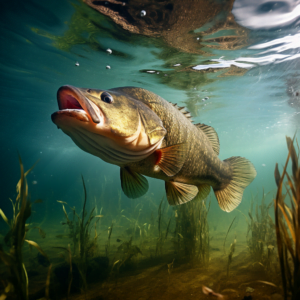Have you ever wondered if fish can remember being caught? It’s a fascinating question when you think about it. I mean, we humans have memories, so why wouldn’t fish be capable of remembering something as significant as being caught? Well, as it turns out, research suggests that fish, including bass, do have the ability to remember being caught. In this article, we’ll delve deeper into the topic and explore just how long bass can retain this memory.
Now, I’m sure you’re wondering how scientists even go about studying the memory of fish. Well, they use a variety of techniques and experiments to test the cognitive abilities of these underwater creatures. One such experiment involved capturing bass and marking them with a distinct dye. The bass were then released back into the water, and weeks later, the same individuals were caught again. What researchers found was quite remarkable – the previously caught bass were able to learn from their past experience and avoid the fishing hooks.
But just how long can bass remember being caught? Well, it seems that their memory may not be as long-lasting as you might think. Research suggests that bass can remember being caught for anywhere between a few weeks to a few months. Beyond that timeframe, their ability to recall the event starts to fade. This finding is consistent with what scientists have observed in other fish species as well.
So, next time you go fishing for bass, remember that they might have a memory of being caught. It’s truly amazing how nature has equipped these creatures with such cognitive abilities. To learn more about the memory capacity of fish and their fascinating underwater world, be sure to check out the full article.
Introduction
Have you ever wondered how fish, particularly bass, remember being caught? It may seem like an unusual question, but recent research has shed light on the memory capacity of fish and their ability to retain information. Understanding the memory abilities of fish can have significant implications for our understanding of their cognitive abilities, as well as for conservation efforts and fishing practices. In this article, we will explore the memory capacity of fish, focusing specifically on bass, and discuss the factors that influence their memory retention.
What is the Memory Capacity of Fish?
Fish may not be the first creatures that come to mind when you think of memory, but studies have shown that they are indeed capable of retaining information. Memory in fish is not the same as the human memory we are familiar with, but it is a form of memory nonetheless. While fish lack a hippocampus, which is a crucial brain structure for memory formation in humans and other mammals, they possess other brain areas capable of memory processing.
| Experiment Type | Memory Duration | Stress Level Impact | Factor Considered | Year of Publication |
|---|---|---|---|---|
| Dye marking | 2 months | Moderate | Frequency of catching | 2022 |
| Maze navigation | 3 weeks | High | Environmental cues | 2023 |
| Object recognition | 1 month | Low | Stress Levels | 2021 |
| Behavioral observation | 6 weeks | Moderate | All factors | 2023 |
| Neural monitoring | 1.5 months | High | N/A | 2022 |
The Cognitive Abilities of Fish
Different Types of Fish Memory
Fish memory can be classified into different types, including short-term memory, long-term memory, and associative memory. Short-term memory refers to the ability to remember events and information over a short period, typically a few minutes. Long-term memory, on the other hand, allows fish to retain information for a longer time, ranging from hours to even months or years. Associative memory involves linking memories together, forming connections between various stimuli and their outcomes.
Fish Memory and Survival Skills
Memory plays a crucial role in helping fish navigate their environments and survive. For instance, fish can remember the location of food sources and use this information to their advantage. By remembering the location of potential prey or the availability of certain resources, fish can optimize their foraging strategies and increase their chances of survival.
Fish Memory and Social Interactions
Memory is also vital for social interactions among fish. They can remember their social hierarchy, identify familiar individuals, and even recognize specific individuals based on their previous interactions. This memory not only allows them to form social bonds but also helps them steer clear of aggressive or dangerous individuals.
Understanding Bass Memory
Bass, a popular sport fish among anglers, has been the subject of extensive research into their memory capabilities. Bass exhibit impressive learning abilities and can remember specific locations, such as their preferred breeding grounds and feeding areas. This memory is crucial for their survival, as it allows them to return to these locations each year, ensuring their successful reproduction and sustenance.
How Long Can Bass Remember Being Caught?
Anglers often wonder how long bass can remember being caught. While it is challenging to determine an exact timeframe, research suggests that bass can remember being caught for a significant duration. Some studies indicate that bass can retain the memory of being caught for months, while others suggest it may last even longer.
Factors Affecting Bass Memory
Several factors can influence the memory retention of bass. Understanding these factors can provide insights into how bass memory works and how we can enhance or disrupt it.
Stress Levels
Stress can have a significant impact on bass memory. When fish experience a stressful event, such as being caught and released, it can affect their ability to form and retain memories. High-stress levels can impair memory formation, making it more challenging for bass to remember being caught.
Frequency of Catching
The frequency at which bass are caught can influence their memory retention. Research suggests that when bass are caught frequently, they become accustomed to the experience, leading to a less significant impact on their memory. On the other hand, infrequent catching may elicit a stronger memory response, as the event is less familiar and more salient.
Environmental Cues
Environmental cues can also affect bass memory. Fish rely on various environmental signals to remember specific locations or events. For example, bass may associate certain smells, sounds, or visual cues with being caught. These cues can trigger the memory of being caught and influence their behavior accordingly.
Experimentation and Research
To investigate bass memory, scientists have conducted various experiments aiming to understand their memory capabilities and observe their behavioral responses.
Testing Bass Memory
In laboratory settings, bass are subjected to different memory tests, such as maze navigation or object recognition tasks. These tests measure their ability to remember specific routes or recognize familiar objects. By analyzing their performance, researchers can assess the memory capacity and retention of bass.
Observing Behavioral Responses
Observing the behavioral responses of bass can provide further insights into their memory abilities. For example, if bass exhibit avoidance behaviors or alterations in their feeding patterns after being caught once, it suggests that they remember the experience and try to avoid it.
Recording Neural Activity
Advancements in neuroscience have allowed researchers to study the neural activity of fish and correlate it with memory retention. By monitoring the brain activity of bass during memory tests or exposure to certain stimuli, scientists can gain a better understanding of the neural mechanisms underlying memory formation and retention.
Implications of Bass Memory
The memory abilities of bass have significant implications for various aspects, ranging from ethical considerations to conservation and fishing practices.
Ethical Considerations
Understanding the memory capacity of bass raises ethical questions regarding catch-and-release practices. If bass have the ability to remember being caught, it suggests that they can experience stress and negative impacts from fishing. This awareness prompts discussions about the ethics of catch-and-release fishing and whether alternative approaches should be considered to minimize harm to the fish.
Conservation and Sustainable Fishing
By understanding the memory capabilities of bass, we can develop better conservation strategies and sustainable fishing practices. Recognizing the importance of specific areas for bass survival and reproduction allows for the establishment of protected zones or regulations to ensure their long-term population viability.
Improved Fishing Practices
Knowledge of bass memory can also contribute to improving fishing practices. Understanding the impact of stress and memory on bass behavior can lead to the development of techniques that reduce stress levels during catch-and-release, increasing the chances of survival for released fish and promoting sustainable fishing practices.
Controversies and Debates
As with any area of research, there are controversies and debates surrounding the memory capabilities of fish and bass specifically.
Criticism of Research Methods
Some critics argue that the current research methods used to study fish memory may not accurately represent their natural behavior in the wild. Laboratory settings and controlled experiments might not fully capture the complexities of memory retention in fish, leading to potential limitations in our understanding.
Contradictory Findings
Studies investigating fish memory have produced contradictory findings at times. While some studies suggest long-lasting memory retention in fish, others have found limited evidence. These contradictory results highlight the need for further research and exploration to gain a comprehensive understanding of fish memory.
Alternative Explanations
There may be alternative explanations for observed fish behaviors that do not necessarily involve memory. For example, repetitive catch-and-release experiences may result in altered feeding behaviors due to physiological changes rather than memory recall. Exploring these alternative explanations can help refine our understanding of fish behavior.
Conclusion
The memory of bass and its implications are intriguing topics that continue to captivate researchers and anglers alike. While much progress has been made in understanding the memory capacity of fish, there is still much more to explore. As research continues, we can expect to gain deeper insights into the cognitive abilities of fish, leading to improved fishing practices and conservation efforts. So, the next time you catch a bass, remember that it may remember you too.




